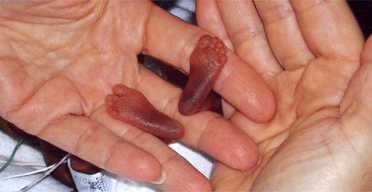- Joined
- Aug 28, 2007
- Messages
- 13,511
- Location
- Manchester
- Gil
- 227
- FFXIV
- Bambi Branford
- FFXIV Server
- Lamia
It's not the same at all, that child can ONLY survive in the mothers womb until it's born, then anyone can keep it alive. It's whether the woman is willing to put her body through a pregnancy she doesn't want just to give the baby up for adoption. I certainly wouldn't be willing to put my body through it
Edit* Nice story, but I won't change my opinion on it, a baby can survive at 19 weeks outside of the womb with the proper medical care, although this is very rare, and for this baby to survive without a severe medical handicap is rarer still. At 24 weeks, a baby can survive with the proper medical care, and I think thats about 7 months, and thats past the cut off for legal abortion, over here at least, so it wouldnt have even been ALLOWED, if that girl was born premature, then she would still have survived
Most women fuind out they are pregnant within like 6 weeks, if that was me Id have an abortion by 8 weeks I guess and so would most women, you really trying to tell me that an 8 week old 'baby' would survive to tell the tale? Most women will have abortions as soon as they can
Edit* Nice story, but I won't change my opinion on it, a baby can survive at 19 weeks outside of the womb with the proper medical care, although this is very rare, and for this baby to survive without a severe medical handicap is rarer still. At 24 weeks, a baby can survive with the proper medical care, and I think thats about 7 months, and thats past the cut off for legal abortion, over here at least, so it wouldnt have even been ALLOWED, if that girl was born premature, then she would still have survived
Most women fuind out they are pregnant within like 6 weeks, if that was me Id have an abortion by 8 weeks I guess and so would most women, you really trying to tell me that an 8 week old 'baby' would survive to tell the tale? Most women will have abortions as soon as they can
Last edited:


 at the fact that you even took the effort to do so. Does this reflect anything you agree or disagree with? What are your thoughts on it? Damn whippersnapper.
at the fact that you even took the effort to do so. Does this reflect anything you agree or disagree with? What are your thoughts on it? Damn whippersnapper. 